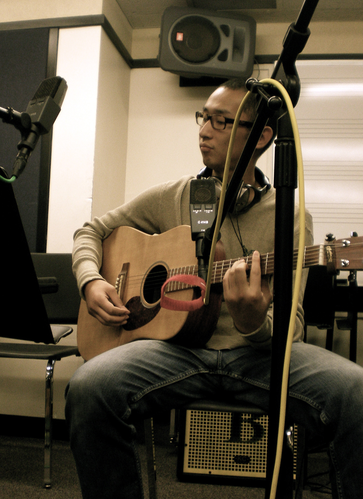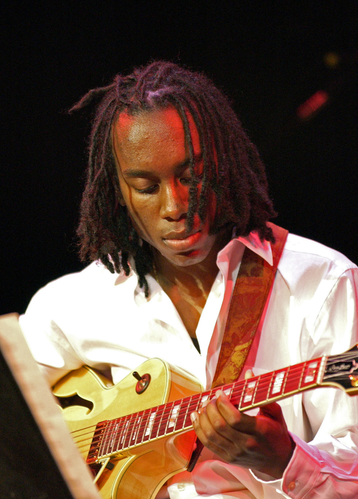Doctors, Lawyers, and Berklee Grads

Margaux Genin is earning a master's degree in branding.

Tatsumi Kazunori, music therapist, is now studying non-musical therapy techniques at Columbia University.

Guitarist Will Junior went from Berklee stages to medical school.
Photo by Phil Farnsworth
Many students graduate from Berklee and do exactly what their major prepared them for: perform, teach music, produce albums, etc. But some find their interests shift. They want to become doctors, ad execs, historians, scientists, or even talk show hosts—all of which are found in the Berklee alumni career list.
Berklee alumni have pursued postgraduate degrees at dozens of institutions. Thirty-eight members of the class of 2011 told the college alumni office that they were starting graduate school in the next year. Along with classic next steps such as the New England Conservatory and the Manhattan School of Music, their choices include Cornell Law and the Culinary Institute of America.
Several young alumni show that the diverging path can be quite fruitful indeed.
The Transition
Music business major Margaux Genin '07 moved to New York for an internship with a DJ who put together mixtapes for the fashion world. But three months later, Genin was working instead for the founders' other company: an agency specializing in online marketing. That put her into a different industry, one that led to a master's program focusing on branding. The degree, at the School of Visual Arts, is the first program of its kind in the United States. The Monaco native won the top scholarship in her home country to cover costs while continuing to work full time.
Genin has found the SVA program a perfect mix of "business, strategy, and creative thinking." It's helped her find a way to tie her two areas of expertise together: Going forward, she envisions helping companies find smarter ways to use music to define their brand.
Tatsumi Kazunori '09 also experienced a gradual shift in his focus after Berklee. As he became more experienced as a music therapist, he discovered that there were ways he wanted to help patients where music didn't really work. He's now studying for a master's degree in clinical psychology at Columbia University while working in a research lab.
"Music is a great way to communicate with patients if they are nonverbal or have difficulty talking. . . music tells more than words," Kazunori says. However, "music is sometimes very abstract." He's learning how to use both music and words depending on what an individual patient needs. "Music is a great tool to identify their problem. Sometimes we do improvisation and while they play they come up with some ideas." Then they start talking about it.
William Junior '07 came to Berklee to play guitar and graduated bound for medical school. The interest stemmed from a book he read for fun in his sophomore year: neurosurgeon Ben Carson's memoir. Carson grew up in tough circumstances, and Junior could relate. Prodded by Berklee president Roger H. Brown, Junior wrote a letter to the doctor and received an encouraging reply. He just finished his first year at Temple University School of Medicine.
The Support
Berklee staff and faculty overwhelmingly express nothing but pride in strong students who change career direction. Students who go on to graduate school "are often people who are multidimensional in their interests," says Peter Spellman, director of Berklee's Career Development Center.
President Brown has continued to follow Junior's progress, as have his old City Music administrators. "William is the perfect example of what we strive to make possible at Berklee—opening the horizons of our students to the full palette of musical options as well as even broader ways to engage one's talents with the larger world," Brown says.
When a student or alumnus expresses interest in postgraduate study, "we try to hook them up with members of the Berklee Career Network," Spellman says. The office also helps students explore their possibilities and clarify their goals. This fall, the college is piloting a cross-departmental two-credit career development course for students in their sixth semester.
Students and alumni also draw on other parts of their Berklee support system as they navigate the application process. Junior relied on George Eastman, a professor in Berklee's Liberal Arts Department. "I wrote like 50-plus essays for medical school, and he was always ready to read [them] over," he says.
Indeed, Junior could have transfered to a different college once he decided to pursue medicine. But he's not one to do things halfway, and going through with his bachelor of music degree gave him the confidence to apply to medical schools. "Through going to Berklee [I] realized that I was capable of doing a lot more than I thought," he says.
The Application
When it comes to getting in, an undergraduate degree in music can be an asset or a liability. "I always encourage students to really get a sense of the culture, of the program," Spellman says. "They vary tremendously."
Berklee was a big plus for Genin. Since the SVA is an arts school offering a business degree, "this program tried to bring students from different backgrounds," she says. "They thought it was really interesting.
Kazunori felt applying to grad school "was challenging," he says. Even though his Berklee education gave him all the course work he needed for the program, "I was a little bit worried about my background." Most of his fellow students have a straight psychology background. (Berklee's new psychology minor may ease this transition for future applicants.)
That concern completely disappeared once he got past admissions and into Columbia. "My colleagues in my school right now, they really appreciate music in general and they are very interested in what I'm doing and other music therapists."
As one might expect, medical school was the most challenging sell. Even though Junior took a post-baccalaureate pre-med program at UMass Boston, his admission committees were skeptical. "The main question was 'Well, how serious can you be about medicine if you've invested so much time in music? Do you know what you're getting into?'"
His strategy was to let them know that he'd done his research and explain how studying music—with its discipline, long hours of practice, and continuous learning cycle—would make him a good doctor.
That aligns with Spellman's tactics, which emphasize "translating their previous education into language that's going to resonate" with non-musicians, he said. Spellman wrote an essay in 2006 discussing Berklee-specific skills that translate well into other arenas. The list includes technological fluency, internal flexibility, and the ability to build coalitions. If you can keep a band going, a surgical team should be no problem.
The School
That said, there are, obviously, some differences when musicians enter a non-musical grad school. All three students have regretfully cut back on their playing time. "With my 80-hour work week . . ." Genin sighed.
Junior didn't want to play music at Temple, but classmates convinced him to perform at a few events. He would have liked to gig all summer, but work comes first.
"Now is a time to just study," Kazunori agreed. He keeps his hand in by teaching music to kids.
But they're all enjoying their new endeavors as they adapt to the new collegiate normal. When you're surrounded not by guitarists and trombonists but by business innovators, psychologists, and people in scrubs, "It's hard to find a jam session!" Kazunori said.
